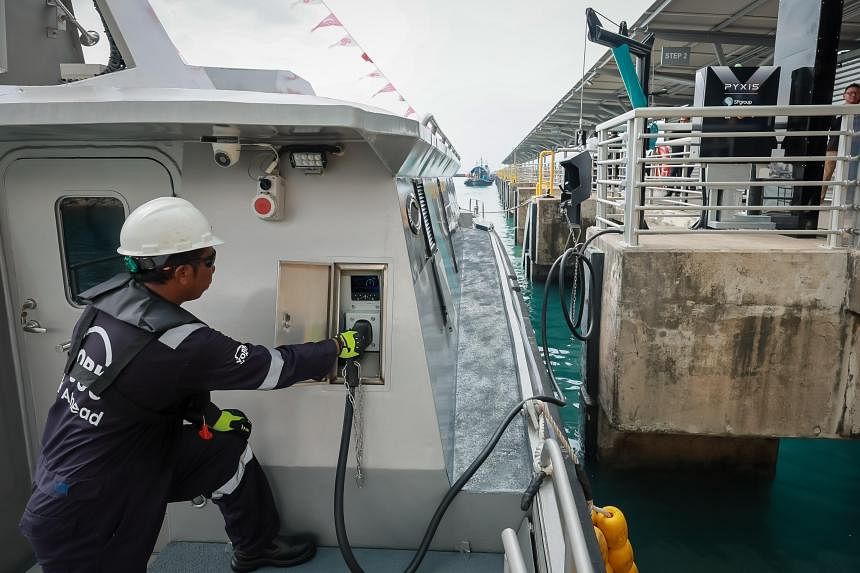SINGAPORE - Singapore will leverage its position as a maritime hub to attract more talent and draw undergraduates whom it can train for careers in the industry, under a proposal by the Singapore Maritime Foundation (SMF).
An envisioned “Hub for Future Skills” will focus on training and developing both sea-going and shore-based professionals to plug any skill gaps. It will coordinate upskilling efforts with institutes of higher learning.
It can also help those considering a career switch to the maritime industry, said SMF.
The proposed hub was among a slew of recommendations laid out by the Tripartite Advisory Panel (TAP) in a report released on April 15 to identify skills the maritime workforce needs and equip workers with the required ones.
For the report, SMF worked with professional services firm EY and spent about nine months conducting a series of industry consultations with industry leaders, including shipowners, marine insurers and ship operators.
The maritime sector is seeing the introduction of technologically advanced vessels, enhanced real-time monitoring capabilities from shore, and a greater reliance on data and artificial intelligence, said the TAP in its report.
This has created a need to equip both sea-going and shore-based personnel with the skills needed for navigating the industry’s transformation, the report said.
Sea-going professionals include deck officers, who are primarily in charge of navigation, cargo management, safety management and communication. They also include engineers who are responsible for the vessel’s mechanical integrity.
Shore-based professionals include roles spanning commercial, operations, fleet technical and corporate functions in a shipowner set-up.
They also include more specialised roles such as lawyers, ship planners or port and terminal operators.
Emerging skill sets that the industry needs for sea-going professionals are the ability to safely handle and manage green fuels, especially as the industry moves towards decarbonisation.
For shore-based professionals, they will need to equip themselves with skills in digitalisation and decarbonisation, such as environmental, social and governance reporting.
Mr Arsenio Dominguez, secretary-general of the International Maritime Organisation, said that digitalisation of the maritime industry does not translate to the displacement of seafarers, as they will always be required.
But at the same time, the industry needs to work with governments to facilitate the transition of these jobs, as seafarers’ experience and expertise will be needed to ensure the effectiveness of digitalisation, he added.
The report also said the industry must address the talent shortage for sea-going roles, which means it will have to look beyond the traditional source pools and enhance human resources policies to help sea-going professionals transition to shore-based careers to attract, and retain, new talent.
TAP was formed in early 2023 to identify transition and future skills, and recommend measures to strengthen the competitiveness of Singapore’s maritime workforce.
Other recommendations in the report include helping maritime professionals to deepen and broaden their skill sets through training.
Some proposed training ideas include promoting international experience and exposure for all shore-based professionals for them to develop more global perspectives, and to build up practical sea-going experience for shore-based professionals through short stints at sea or simulators.
TAP also recommends the industry enhance its human resources policies, such as by addressing the needs of maritime professionals over different life stages, like marriage and family needs.
It will also need to reach out to students and non-maritime professionals to attract talent.
“This will enable the sector to tap diverse skill sets to solve complex challenges for the industry, which will require capabilities from domains outside of maritime,” it said.
Examples of outreach include introducing internship programmes at all levels and across different disciplines, and organising learning journeys and exhibitions that let maritime and non-maritime participants get hands-on exposure to maritime projects.
As employees now place greater importance on diversity, equity and inclusion in company culture, companies that incorporate these values into their policies and culture will be able to attract and engage a wider talent pool, said TAP.
Besides deepening technical skills, maritime professionals will also have to work on soft skills, such as problem-solving, leadership and communication skills, said Mr Goh Jia Yong, partner for people consulting services at EY.
- Additional reporting by Esther Loi


